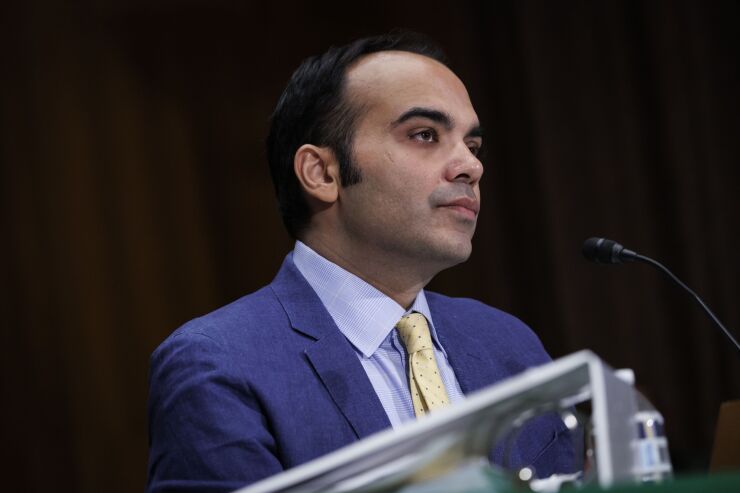
WASHINGTON — The Consumer Financial Protection Bureau has issued an advisory opinion barring banks and credit unions with more than $10 billion in assets from charging consumers "excessive fees" for basic information about their own accounts.
The bureau cited, in its rationale for the advisory opinion, a provision in the Consumer Financial Protection Act that requires banks and credit unions with more than $10 billion in assets to provide account information when it is requested by consumers.
The CFPB said it "does not intend to seek monetary relief" for potential violations of this provision that occurred before Feb. 1, 2024.
"Congress passed a law a decade ago requiring heightened customer service standards," said CFPB Director Rohit Chopra. "To date, this law has not been enforced. We are changing that."
The relevant portion of the law — section 1034(c) — says only that a bank has to provide that information in a "timely manner," and does not specifically mention fees associated with those requests. A senior administration official told American Banker that bank fees associated with those requests can go beyond the reasonable costs of complying with the request — costs like identity verification and data security measures.
"Large banks may not impose conditions that unreasonably impede consumers' information requests," said the senior official. "The practice of charging fees to respond to an information request would generally unreasonably impede consumers' exercise of their rights under section 1034(c), and thus violate the provision."
Chopra attributed the bureau's decision to issue an advisory opinion to what the CFPB called large banks' "shift away from a relationship banking model."
"Local banks tend to put a heavy emphasis on customer service because they make their money through their customer relationships," Chopra said. "That's why they'll often take the time to help you with any problems that arise. But big banks in our country have mostly abandoned relationship banking, and have shifted toward algorithmic banking or assembly line-style banking. Many of them now use chatbots and artificial intelligence to discourage or prevent us from talking to a human."
In the past, banking groups have pushed back against the CFPB's attempts to regulate via this particular portion of the Consumer Financial Protection Act. The CFPB
The Bank Policy Institute, Consumer Bankers Association and American Bankers Association wrote in
The banking groups also challenged the CFPB's legal ability to regulate customer service. In the letter, they said that banks' obligations to provide customer information in a timely manner "is very different from an obligation to serve customers on particular terms or in a certain manner more generally."
The CFPB's advisory opinion is part of a larger effort from the Biden administration to quash so-called "junk fees." Alongside the opinion, the CFPB released a special edition of its semiannual
According to the CFPB's report, institutions that have eliminated non-sufficient funds fees — which are similar to overdraft fees but are charged when a check bounces or a debit card purchase is declined — are saving consumers $2 billion every year.
The Federal Trade Commission also announced a new proposed rule that would aim to eliminate unfair and deception charges. The rule would require businesses to include all mandatory fees when telling consumers a price.






